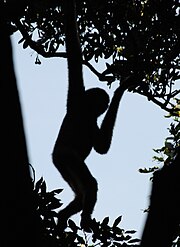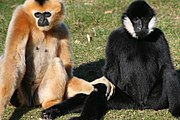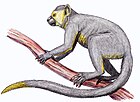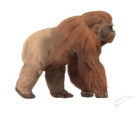Nomascus is the second-most speciose genus of the gibbon family, Hylobatidae. Originally, this genus was a subgenus of Hylobates, with all individuals considered to be one species, H. concolor.
Species within Nomascus are characterized by 52 chromosomes. Some species are all-black, some are a lighter beige or peach hue, with a distinct black tuft of crown fur, while others have notable, light-colored cheek “patches”. Nomascus is endemic from southern China (Yunnan) to southern Vietnam, and can also be found on Hainan. Every species within this genus are either endangered or critically endangered; the Eastern black crested gibbon (Nomascus nasutus) has been deemed "the most-critically endangered ape species in the world".[2]
Extant species
| Common name | Scientific name and subspecies | Range | Size and ecology | IUCN status and estimated population |
|---|---|---|---|---|
| Black crested gibbon
|
Nomascus concolor (Harlan, 1826) Four subspecies
|
China, Laos, and northern Vietnam
|
Size: Habitat: Diet: |
CR
|
| Eastern black crested gibbon
|
Nomascus nasutus (Künckel d'Herculais, 1884) |
northeast Vietnam
|
Size: Habitat: Diet: |
CR
|
| Hainan black crested gibbon | Nomascus hainanus (Thomas, 1892) |
Hainan Island, China.
|
Size: Habitat: Diet: |
CR
|
| Northern white-cheeked gibbon | Nomascus leucogenys (Ogilby, 1840) |
northern Vietnam and northern Laos
|
Size: Habitat: Diet: |
CR
|
| Southern white-cheeked gibbon | Nomascus siki (Delacour, 1951) |
Vietnam and Laos.
|
Size: Habitat: Diet: |
EN
|
| Yellow-cheeked gibbon | Nomascus gabriellae (Thomas, 1909) |
Vietnam, Laos, and Cambodia
|
Size: Habitat: Diet: |
EN
|
| Northern buffed-cheeked gibbon
|
Nomascus annamensis Thinh et al., 2010 |
Vietnam, Cambodia, and Laos.
|
Size: Habitat: Diet: |
EN
|
Classification
- Family Hylobatidae: gibbons[1]
- Genus Hylobates
- Genus Hoolock
- Genus Symphalangus
- Genus Nomascus
- Black crested gibbon, Nomascus concolor
- Tonkin black crested gibbon, Nomascus concolor concolor
- Laotian black crested gibbon, Nomascus concolor lu
- Central Yunnan black crested gibbon, Nomascus concolor jingdongensis
- West Yunnan black crested gibbon, Nomascus concolor furvogaster
- Eastern black crested gibbon, Nomascus nasutus
- Hainan black crested gibbon, Nomascus hainanus[3]
- Northern white-cheeked gibbon, Nomascus leucogenys
- Southern white-cheeked gibbon, Nomascus siki
- Yellow-cheeked gibbon, Nomascus gabriellae
- Northern buffed-cheeked gibbon, Nomascus annamensis[4]
- Black crested gibbon, Nomascus concolor
References
- ^ a b Groves, C. P. (2005). Wilson, D. E.; Reeder, D. M. (eds.). Mammal Species of the World: A Taxonomic and Geographic Reference (3rd ed.). Baltimore: Johns Hopkins University Press. pp. 180–181. ISBN 0-801-88221-4. OCLC 62265494.
- ^ a b Geissmann, Thomas (December 1995). "Gibbon systematics and species identification" (PDF). International Zoo News. 42: 467–501. Retrieved 2008-08-15.
- ^ Thomas Geissmann (April 2007). "Status reassessment of the gibbons: Results of the Asian Primate Red List Workshop 2006". Gibbon Journal (3).
- ^ Van Ngoc Thinh; Alan R. Mootnick; Vu Ngoc Thanh; Tilo Nadler; Christian Roos (2010). "A new species of crested gibbon, from the central Annamite mountain range". Vietnamese Journal of Primatology. 1 (4): 1–12.










Recent Comments